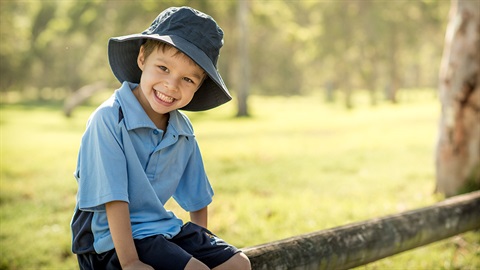Bush kinder and nature play

Outdoor learning lets you teach children how to be more caring to the natural world, encouraging love and a curiosity for animal and plant life.
Bush kinder and playgroup
Across Darebin, there are many outdoor spaces where you can experience nature in play.
What is nature play?
If you’ve had fun outside, observed and listened to birds calling, climbed on logs and rocks, played in the dirt, dug in sand, ran through fallen leaves or rolled down hills, then you have already experienced nature play.
Throughout Darebin there are many parks and reserves where you can experience nature play.
Why take the classroom outdoors?
Parks, reserves and bushlands are fantastic areas for children to run, jump, explore and learn. We understand why this is becoming more popular in Darebin! Inviting nature play into the lives of young people can have many benefits and improves social skills, physical and mental health, develops self-esteem, awareness and independence.
Outdoor learning allows early education providers to teach children how to be more caring to the natural world, encouraging love and a curiosity for animal and plant life. Also, by moving the classroom outdoors, you are helping build the next generation of supporters for healthy parks.
Bush kinder and playgroup principles
- Take only memories, leave only footprints. Use photos, drawings or a nature journal to take home your memories instead of taking something from the park.
- Build a program that regularly rotates different bush sites. In order to give conservation zones the ability to regenerate, Bush Kinder programs must regularly move to new sites. This means establishing a program that moves to different nature play zones.
- Leave the site as you found it - Moving logs, rocks or plants disturbs the animals who have made homes there.
- Respect the vegetation - Avoid stepping on or pulling at plants. Our landscapes are often replanted through the hard work of volunteers so please respect their efforts and do not play in areas where there are young plants growing.
- There is no storage available at any site managed by Darebin. Take all your belongings, leave no trace.
- Please take all your rubbish home. Check the area before you leave to make sure you haven’t left anything behind.
See our Bush Kinder and Playgroup handbook for more information and suggestions about where you can plan your next nature play experience.
Download Bush Kinder and Playgroup handbook(PDF, 16MB)
Keep our parks wild
- Animals are healthiest eating their natural food, so please do not share your food with them.
- Don’t break or snap branches to make shelters, as this may cause plants to become sick from disease.
- Respect all animals’ homes by leaving rocks, logs, leaf litter and plants where you find them.
- Never walk up to wild animals as they may become fearful and attack. Look at them from a safe distance.
- Respect any evidence of the past. Parks are there to protect and preserve our history.
- Keep yourself safe. Stay on paths and walking tracks.
- Please remember that overuse of sites can cause a lot of damage and can negatively affect many years of important conservation work. As such, we may prevent access to sites at different times. Please remember to register your intention to visit, so that we can work together to find a suitable alternative.
Plan before you go
- Prepare your risk management plan for your group. For more information, please visit the Department of Education website.
- Contact us and sign up for a site induction session. You can by emailing darebinparks@darebin.vic.gov.au or calling Customer Service on 03 8470 8888. This will give our Bushland Team the opportunity to share with you the best places to visit and when is the best time to visit or not visit. Some of our native spaces are sprayed at different times of the year and we will help you to avoid these areas at these times.
- Consider inviting one of our Bushland Team members to join you for a part of your first session. Rangers can educate students about the local area, showing them the local plants and animals and how to take care in the bush. It is a fun and engaging way to get students comfortable in the outdoors.
- Learn more about the Wurundjeri Woi Wurrung People who are the Traditional Owners of the Land and share the children’s Acknowledgement of Country for when you arrive on site. For more information please visit Wurundjeri website. You may also like to consider the storybook by Aunty Joy Murphy called ‘Welcome to Country’.
- You may also invite our Local Laws Officers to lead an animal safety session. Here, children will learn about how to safely handle animals, how to beat their fears and how to act responsibly with our four-legged friends.
- Consider setting up a fire education session with Fire Rescue Victoria (previously known as the Melbourne Fire Brigade).
- Make sure you and your students are prepared with the right clothing and equipment (correct footwear/ sun protection, clothing and first aid kit).
- Have a discussion with your students about caring for the bush, how we can step lightly and reduce rubbish.
- Find out about what you can do in the park before you go.
- Check weather conditions before you go.